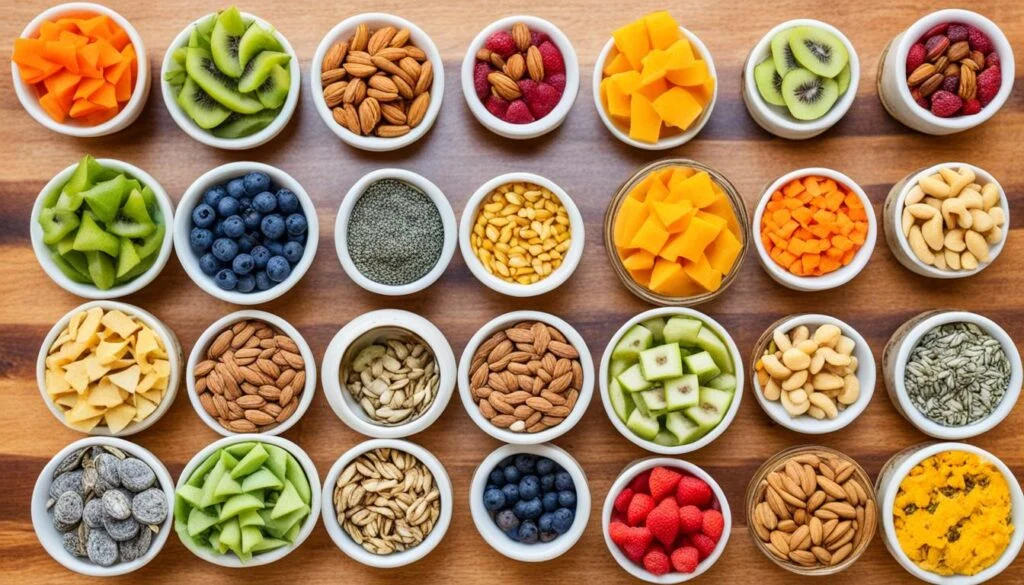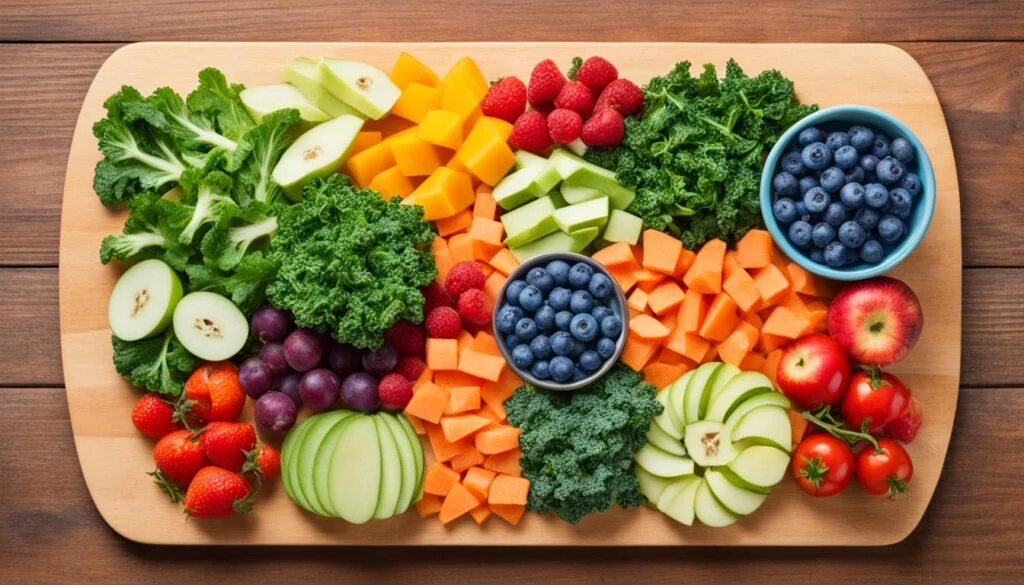Did you know that hamsters require a carefully balanced diet to stay healthy and thrive? Providing the right nutrients is essential for their overall well-being. If you’re looking for ways to make homemade hamster food, we’ve got you covered! In this article, we’ll share easy hamster food recipes and show you how to create a nutritious diet for your furry friend.
Whether you’re a new hamster owner or simply want to enhance your pet’s diet, making your own hamster food is a great way to ensure they receive the necessary nutrients. Plus, it can be a fun and rewarding experience for both you and your furry companion!
So, let’s dive in and discover how to create homemade hamster food that will keep your hamster happy and healthy. From carbohydrates and fats to essential proteins and a variety of fruits, vegetables, and grains, we’ll cover it all. Get ready to become a DIY hamster food expert!
Making the Bulk of the Diet: Carbohydrates and Fats.
The bulk of a hamster’s diet should consist of carbohydrates and fats, as these provide the necessary energy for them to stay active and maintain body temperature. However, it’s crucial to strike a balance and not overfeed your hamster with just this category of food to prevent weight gain and health issues.
When preparing a homemade hamster diet, you have various options for incorporating carbohydrates and fats. Consider including ingredients like organic bird seed, unsalted sunflower seeds, dried corn, unsalted nuts, nut butters, cooked potatoes, and various grains. These ingredients serve as excellent sources of carbohydrates and fats, offering a well-rounded nutritional profile for your furry friend.
Let’s take a closer look at some of the key ingredients:
Organic bird seed
Organic bird seed is a popular choice for homemade hamster snacks and meals. It contains a mix of grains and seeds, providing carbohydrates and healthy fats to your hamster’s diet.
Unsalted sunflower seeds
Unsalted sunflower seeds are another great addition to the hamster’s diet. They are rich in fats, proteins, vitamins, and minerals, making them a nutritious snack or ingredient for homemade hamster food recipes.
Dried corn
Dried corn is a tasty and energy-packed ingredient that hamsters enjoy. It’s a good source of carbohydrates, vitamins, and minerals, providing additional nutritional value to your homemade hamster snacks.
Unsalted nuts and nut butters
Unsalted nuts and nut butters, such as almond butter or peanut butter without added salt, can be included in your hamster’s diet. These ingredients offer healthy fats and protein while adding a delicious flavor to homemade hamster treats.
Cooked potatoes
Cooked potatoes are a starchy source of carbohydrates that can be served to your hamster in moderation. Make sure to remove any seasoning or additives, and only offer plain cooked potatoes to maintain the nutritional balance.
Various grains
Incorporating a variety of grains like oats, barley, wheat, and millet can help diversify your hamster’s diet. These grains are rich in carbohydrates and provide essential nutrients to support their overall well-being.
By including these ingredients in your homemade hamster food recipes, you can ensure that your furry friend receives the necessary carbohydrates and fats for a balanced diet.
| Carbohydrate and Fat Sources | Description |
|---|---|
| Organic bird seed | A mix of grains and seeds that provides carbohydrates and fats. |
| Unsalted sunflower seeds | Rich in healthy fats, proteins, vitamins, and minerals. |
| Dried corn | Tasty and energy-packed, offering carbohydrates, vitamins, and minerals. |
| Unsalted nuts and nut butters | Provide healthy fats and protein, adding a delicious flavor to homemade hamster treats. |
| Cooked potatoes | Starchy source of carbohydrates when served plain and without seasoning. |
| Various grains | Including oats, barley, wheat, and millet to diversify the hamster’s diet and provide carbohydrates. |
Providing Essential Protein for Hamsters.
Hamsters require protein for their growth and overall health. It is essential to incorporate protein-rich foods into their homemade hamster diet. By offering a variety of protein sources, you can ensure that your hamster receives the necessary nutrients for optimal well-being.
Organic Chicken, Turkey, and Eggs
Organic chicken, turkey, and eggs are excellent sources of protein for your hamster. Ensure that the poultry is cooked thoroughly without seasoning to avoid any potential health risks. Eggs can be hard-boiled and offered as a nutritious protein option.
Live Insects
Live insects such as mealworms or crickets are natural sources of protein that hamsters enjoy. You can find these insects at pet stores or even breed them yourself. Just ensure that the insects are gut-loaded, meaning they have been fed with nutrient-rich foods before being fed to your hamster.
Plant-Based Options
If you prefer to provide plant-based protein options, there are several choices that can fulfill your hamster’s protein requirements. Beans, peas, and nuts are nutritious plant-based protein sources that you can incorporate into their diet. You can also offer oats and wheat, which are easily accessible and provide additional nutrients.
Remember, it’s essential to offer protein-rich foods two to three times a week as part of your homemade hamster food. This variety will ensure that your hamster receives a balanced and nutritious diet.
Variety is the Key to a Balanced Diet.
To ensure that your hamster receives all the necessary vitamins and minerals, it’s essential to offer a variety of fruits, vegetables, proteins, and grains. A diverse range of foods will help keep your hamster’s diet well-rounded and nutrient-rich.
Be observant of what your hamster eats and what it rejects, as this can indicate if it’s lacking in any particular nutrient. If your hamster consistently rejects a specific category of food, such as sources of calcium, consider investing in a hamster health supplement to prevent deficiencies.
Incorporate the following elements into your hamster’s diet:
- Fruits: Provide a mix of fruits such as apples, bananas, grapes, melons, and berries. Make sure to remove any seeds or pits that could be harmful to your hamster.
- Vegetables: Offer a variety of vegetables like carrots, broccoli, spinach, cucumber, and bell peppers. These provide essential vitamins and minerals for your hamster’s overall health.
- Proteins: Include sources of protein such as cooked chicken, turkey, or eggs. You can also offer mealworms or crickets as a treat for some added protein.
- Grains: Introduce different grains like oats, barley, quinoa, and whole wheat. These provide carbohydrates and fiber to support your hamster’s digestion.
By providing a wide range of ingredients, you can ensure that your hamster enjoys a balanced and nutritious homemade diet.
Sample Table: Nutritional Content of Homemade Hamster Diet
Note: The nutritional content may vary depending on the specific ingredients used.
| Food Item | Protein (g) | Carbohydrates (g) | Fat (g) | Fiber (g) | Vitamins | Minerals |
|---|---|---|---|---|---|---|
| Apples | 0.3 | 13.8 | 0.4 | 2.4 | Vitamin C | Potassium |
| Carrots | 0.9 | 9.6 | 0.2 | 2.8 | Vitamin A, K | Potassium |
| Chicken (cooked) | 23.2 | 0 | 1.7 | 0 | Vitamin B6, B12 | Iron, Zinc |
| Oats | 13.2 | 66.3 | 7 | 10.6 | Vitamin B1, B5 | Magnesium |

Healthy Treats in Moderation.
Treats play a role in hamster nutrition but should be given in moderation. It’s important to avoid feeding your hamster sugary or salted foods, as well as processed human food, as these can be harmful to their health. Instead, opt for small pieces of organic vegetables or fruits as treats. Organic produce ensures that your hamster receives the best quality nutrition. However, there are certain foods that should be avoided as they can be toxic to hamsters, such as citrus fruits, onions, leeks, chives, garlic, raw potato, aubergine, or avocado.
When offering treats, remember to do so sparingly. Treats should only be given a few times a week to prevent excessive sugar intake, which can lead to weight gain and other health issues. By providing treats in moderation, you can still reward and bond with your hamster while maintaining their overall health and well-being.
Hamster Dental Health with Hard Biscuits.
Hamsters have continuously growing teeth that need to be kept in check to prevent overgrowth and dental issues. Providing suitable items for them to chew on is essential for their dental health. Hard biscuits made from quality ingredients can serve this purpose and also act as a tasty homemade hamster treat.
You have the option to purchase organic hard biscuits online or make your own at home. Here’s a simple recipe for homemade hamster biscuits:
- Gather the following ingredients:
- 1 cup whole wheat flour
- 1/2 cup rolled oats
- 1 tablespoon dried parsley
- 2 tablespoons powdered milk
- 1 tablespoon unsweetened peanut butter
- 1 egg
- 1/4 cup water
Optional Ingredients:
You can experiment with the biscuit recipe by adding different types of seed or nut butters, such as flaxseed, millet, or different types of whole grain flour. Be creative and tailor the recipe to your hamster’s preferences and dietary needs.
| Biscuit Recipe | Nutritional Information |
|---|---|
| Whole Wheat Flour | Source of fiber and carbohydrates |
| Rolled Oats | High in fiber and provide essential nutrients |
| Dried Parsley | Contains vitamins and antioxidants |
| Powdered Milk | Provides calcium for healthy teeth and bones |
| Unsweetened Peanut Butter | Good source of protein and healthy fats |
| Egg | Source of protein and essential amino acids |
| Water | Hydration and helps bind the ingredients together |
These homemade biscuits are not only beneficial for your hamster’s dental health but also make delightful snacks that they’ll enjoy gnawing on. Remember to provide them in moderation and alongside a balanced diet to ensure optimal nutrition and overall well-being for your furry friend.
Other Food Options for Hamsters.
While hamsters primarily rely on a diet that includes grains, seeds, vegetables, and proteins, they can also enjoy certain healthy human foods as occasional treats. These treats can add variety to their diet and provide additional nutrients. Here are some options you can consider:
1. Whole Wheat Organic Bread
Occasionally, you can offer your hamster a small piece of whole wheat organic bread as a treat. Make sure the bread is free from additives, preservatives, and added sugar or salt. However, it’s important to remember that bread should not be a regular part of their diet, as it can be high in carbohydrates.
2. Unsweetened Cereal
An unsweetened cereal, such as plain Cheerios or puffed rice, can be a tasty and crunchy treat for your hamster. Look for options with minimal added sugars and avoid those that contain chocolate or other harmful ingredients.
3. Scrambled Eggs
Scrambled eggs can provide your hamster with a protein boost. Cook the eggs thoroughly without adding any seasoning or salt. Offer a small piece of scrambled egg as an occasional treat to vary their protein sources.
4. Uncooked Pasta
Uncooked pasta, such as small pieces of penne or macaroni, can be given to your hamster as a treat. Make sure the pasta is plain and unseasoned. Avoid using flavored or colored pasta, as it may contain additives that are not suitable for hamsters.
Remember to introduce these treats gradually and in small quantities to avoid digestive upset. Monitor your hamster’s reaction to each new food to ensure they tolerate it well. Additionally, always prioritize the well-being of your hamster and provide a balanced and appropriate diet.

Replicating Natural Hamster Eating Habits.
In the wild, hamsters are omnivores and have a diverse diet consisting of seeds, insects, and plants. To ensure a healthy and balanced diet for your hamster in captivity, it’s important to replicate their natural eating habits. This means including a mix of grains, seeds, herbs, vegetables, protein, nuts, and treats in their daily meals. By providing a varied and species-appropriate hamster diet, you can promote their overall health and well-being.
To replicate natural hamster eating habits, here are some key factors to consider:
- Offer a variety of foods: Include different types of grains, seeds, herbs, and vegetables to provide a diverse range of nutrients. This will help mimic the variety of foods that hamsters consume in the wild.
- Ensure access to protein: Hamsters require protein for growth and muscle development. Include sources of protein such as cooked chicken, turkey, eggs, or plant-based options like beans and peas in their diet.
- Include carbohydrates and fats: Provide carbohydrates and healthy fats to meet your hamster’s energy needs. Options like whole grains, seeds, and nuts can be included in their meals.
- Offer fruits and vegetables: Include a variety of fruits and vegetables in their diet to provide essential vitamins, minerals, and antioxidants. Choose different colors to ensure they receive a broad spectrum of nutrients.
- Consider natural treats: Treats can be given occasionally to add variety and enrichment to your hamster’s diet. Homemade hamster snacks can be a great option, as they allow you to control the ingredients and ensure they are healthy and suitable for your hamster.
Creating a table to showcase a sample daily meal plan for a hamster:
| Meal | Food Items |
|---|---|
| Breakfast | Oatmeal with diced apple and flaxseed |
| Lunch | Mixed seeds, such as sunflower seeds, pumpkin seeds, and flaxseeds |
| Snack | Cucumber slices |
| Dinner | Baked chicken with steamed broccoli and quinoa |
| Treat | Homemade hamster snack made with oats, carrots, and peanut butter |
Remember to always observe your hamster’s preferences and adjust their diet accordingly. Providing a well-rounded and species-appropriate diet will help promote their health, happiness, and longevity.
Watch Portion Sizes and Hydration.
When it comes to feeding your hamster, it’s important to monitor portion sizes and ensure proper hydration. Hamsters typically consume about a tablespoon of food per day, so offering a steady supply of fresh food is essential.
Hamsters have a natural instinct to eat what they need and leave behind what they don’t, so it’s crucial to observe their preferences and adjust their diet accordingly. Pay attention to the foods they enjoy and provide them in appropriate quantities to maintain a balanced diet.
Along with a nutritious diet, hydration is key to your hamster’s well-being. Always provide fresh water in a hamster water bottle and change it daily to ensure your furry friend stays hydrated. Avoid offering other liquids like juice or milk, as they can contain excessive sugar that is not suitable for hamsters.
| Portion Sizes | Hydration |
|---|---|
|
|
Conclusion: Ensuring a Happy and Healthy Hamster.
Feeding your hamster a homemade diet using natural ingredients is the key to maintaining their overall health and happiness. By preparing homemade hamster food, you have complete control over the ingredients and can provide a nutritionally balanced meal plan. Including a variety of carbohydrates, fats, proteins, fruits, vegetables, grains, and healthy treats ensures that your hamster receives all the essential nutrients they need.
It’s important to offer a balanced and species-appropriate diet to meet your hamster’s specific dietary requirements. Watch portion sizes to prevent overfeeding and obesity. Fresh water should be readily available in a hamster water bottle to keep your pet hydrated at all times.
Remember, treats should be given in moderation to maintain a healthy diet. Opt for natural and healthy homemade hamster treats over processed and sugary options. By replicating their natural dietary habits, you’re providing your furry friend with optimal nutrition and promoting their well-being.
So, embark on the journey of creating a homemade hamster diet with easy DIY recipes. Care for your hamster’s health by ensuring they enjoy a diverse and nutritious diet. With a little effort, you can be confident that your hamster is on their way to a happy and healthy life.
